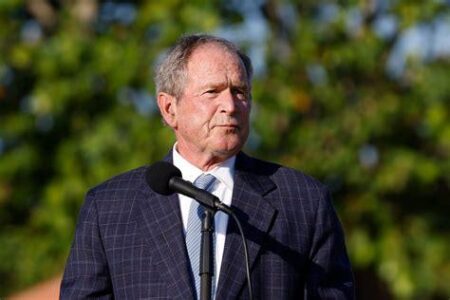
September 20, 2001: When US President George W Bush declared War on Global Terror
The unprecedented terrorist attacks on the United States on September 11, 2001 led to an equally unprecedented response led by the United States against the terror outfits that were deemed responsible for those attacks and those countries harbouring and training these terrorists.
President George Bush declared right after the attacks that the attacks were carried out right at the heart of the civilized world and it has brought the world together to fight this menace whichever way possible and root out this evil from the face of the earth.
The war on terror, which was officially called the Global War on Terrorism (GWOT), was an international counter-terrorism military campaign initiated by the United States following the September 11 attacks. The targets of the campaign are primarily Islamic terrorist groups, with prominent targets including al-Qaeda and the Islamic State of Iraq and the Levant (ISIL).
The 43rd President of the United States George W. Bush first used the term “war on terrorism” on 16 September 2001, and then “war on terror” a few days later on September 20, 2001 in a formal speech to Congress. Bush indicated the enemy of the war on terror as “a radical network of terrorists and every government that supports them.” The initial conflict was aimed at al-Qaeda, with the main theater being located in Afghanistan and Pakistan, a region that would later be referred to as “AfPak”.
The term “war on terror” was immediately criticized by individuals including Richard Myers, then Chairman of the Joint Chiefs of Staff, and eventually more nuanced terms came to be used by the Bush administration to define the campaign. While “war on terror” was never used as a formal designation of U.S. operations, a Global War on Terrorism Service Medal was issued by the U.S. Armed Forces.
The Obama administration sought to avoid using the term and instead preferred to use the term Overseas Contingency Operation. On 23 May 2013, Obama announced that the Global War on Terror was over, indicating that the U.S. would not wage war against a tactic but would instead focus on a specific group of terrorist networks. The rise of ISIL led to the global Operation Inherent Resolve, and an international campaign to destroy the terrorist organization.
The notion of a “War on Terror” was contentious, with critics charging that it has been used to reduce civil liberties and infringe upon human rights, such as controversial actions by the U.S. including surveillance, torture, and extraordinary rendition, and drone strikes that resulted in the deaths of suspected terrorists but also civilians. Many of the U.S.’ actions were supported by other countries, including the 54 countries that were involved with CIA black sites, or those that assisted with drone strikes.
Criticism of the war on terror has focused on its morality, efficiency, and cost. According to a 2021 study conducted by the Watson Institute for International and Public Affairs, the several post-9/11 wars participated in by the United States in its war against terror have caused the displacement, conservatively calculated, of 38 million people in Afghanistan, Pakistan, Iraq, Libya, Syria, Yemen, Somalia, and the Philippines; 26.7 million people have returned home following displacement. The study estimated these wars caused the deaths of 897,000 to 929,000 people, including over 364,000 civilians, and cost $8 trillion. Critics accuse participating governments of using the “War on Terror” to repress minorities or sideline domestic opponents,[55][56] of mainstreaming Islamophobia, and have criticized negative impacts to health and the environment, resulting from the “War on Terror”. Critics assert that the term “war” is not appropriate in this context (much like the term “war on drugs”) since terror is not an identifiable enemy and it is unlikely that international terrorism can be brought to an end by military means ever.
Source: Times Now News





